| Listing 1 - 10 of 29 | << page >> |
Sort by
|
Book
ISBN: 9781107680555 9781107069954 1107680557 1107069955 9781107707115 1139986481 1139991116 1107707110 Year: 2014 Publisher: Cambridge : Cambridge University Press,
Abstract | Keywords | Export | Availability | Bookmark
 Loading...
Loading...Choose an application
- Reference Manager
- EndNote
- RefWorks (Direct export to RefWorks)
What is political philosophy? Ronald Beiner makes the case that it is centrally defined by supremely ambitious reflection on the ends of life. We pursue this reflection by exposing ourselves to, and participating in, a perennial dialogue among epic theorists who articulate grand visions of what constitutes the authentic good for human beings. Who are these epic theorists, and what are their strengths and weaknesses? Beiner selects a dozen leading candidates: Arendt, Oakeshott, Strauss, Löwith, Voegelin, Weil, Gadamer, Habermas, Foucault, MacIntyre, Rawls, and Rorty. In each case, he shows both why the political philosophies continue to be intellectually compelling and why they are problematic or can be challenged in various ways. In this sense, Political Philosophy attempts to draw up a balance sheet for political philosophy in the twentieth century, by identifying a canon of towering contributions and reviewing the extent to which they fulfil their intellectual aspirations.
Political science --- Science politique --- Philosophy. --- Philosophie --- Political philosophy
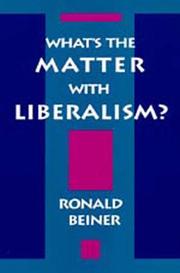
ISBN: 0520077938 0520203356 0585299625 Year: 1992 Publisher: Berkeley : University of California Press,
Abstract | Keywords | Export | Availability | Bookmark
 Loading...
Loading...Choose an application
- Reference Manager
- EndNote
- RefWorks (Direct export to RefWorks)
Citizenship --- Civil rights --- Liberalism --- Political ethics --- Political science --- -Social justice --- Socialism --- #A9301A --- Philosophy --- Liberalism. --- Political ethics. --- Civil rights. --- Citizenship. --- Social justice. --- Socialism. --- Social justice --- Law, Politics & Government --- Human Rights --- Philosophy. --- Marxism --- Social democracy --- Socialist movements --- Collectivism --- Anarchism --- Communism --- Critical theory --- Equality --- Justice --- Administration --- Civil government --- Commonwealth, The --- Government --- Political theory --- Political thought --- Politics --- Science, Political --- Social sciences --- State, The --- Ethics, Political --- Ethics in government --- Government ethics --- Politics, Practical --- Ethics --- Civics --- Liberal egalitarianism --- Liberty --- Basic rights --- Civil liberties --- Constitutional rights --- Fundamental rights --- Rights, Civil --- Constitutional law --- Human rights --- Political persecution --- Birthright citizenship --- Citizenship (International law) --- National citizenship --- Nationality (Citizenship) --- Public law --- Allegiance --- Domicile --- Political rights --- Moral and ethical aspects --- Law and legislation --- Political philosophy
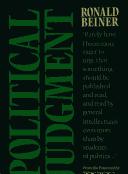
ISBN: 0416342809 9780416342802 Year: 1983 Publisher: London Methuen
Abstract | Keywords | Export | Availability | Bookmark
 Loading...
Loading...Choose an application
- Reference Manager
- EndNote
- RefWorks (Direct export to RefWorks)
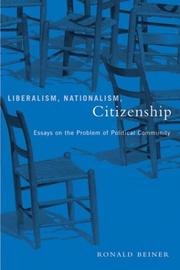
ISBN: 128312985X 9786613129857 0774850418 9780774850414 0774809876 9780774809870 9780774809870 6613129852 Year: 2003 Publisher: Vancouver : ©2003 UBC Press,
Abstract | Keywords | Export | Availability | Bookmark
 Loading...
Loading...Choose an application
- Reference Manager
- EndNote
- RefWorks (Direct export to RefWorks)
Liberals believe that the purpose of politics is to guarantee that individuals do not face unfair impediments in pursuing the lives they choose for themselves. Nationalists believe that the purpose of politics is to ensure that a people's sense of authentic nationhood wins full expression in powers of collective sovereignty or self-rule. Both of these forms of political commitment yield world-transforming political philosophies, but do either of these visions do adequate justice to a philosophically robust ideal of shared citizenship and civic membership? In Liberalism, Nationalism, Citizenship, Ronald Beiner engages critically with a wide range of important political thinkers and current debates in light of the Aristotelian idea that shared citizenship is an essential human calling. Virtually every aspect of contemporary political experience -- globalization, international migration, secessionist movements, the politics of multiculturalism -- pose urgent challenges to modern citizenship. Beiner's work on the philosophy of citizenship is essential reading not just for students of politics and political philosophy, but for all those who rightly sense that these kinds of recent challenges demand an ambitious rethinking of the nature of political community.
Citizenship. --- Liberalism. --- Nationalism. --- Civil society. --- Social contract --- Consciousness, National --- Identity, National --- National consciousness --- National identity --- International relations --- Patriotism --- Political science --- Autonomy and independence movements --- Internationalism --- Political messianism --- Liberal egalitarianism --- Liberty --- Social sciences --- Birthright citizenship --- Citizenship --- Citizenship (International law) --- National citizenship --- Nationality (Citizenship) --- Public law --- Allegiance --- Civics --- Domicile --- Political rights --- Law and legislation
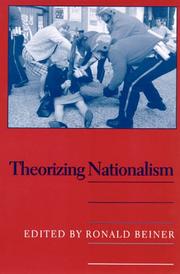
ISBN: 9780791440667 058509053X 9780585090535 9780791440650 0791440656 0791440664 0791440656 0791440664 0791496155 Year: 1999
Abstract | Keywords | Export | Availability | Bookmark
 Loading...
Loading...Choose an application
- Reference Manager
- EndNote
- RefWorks (Direct export to RefWorks)
Presents some of the best work by political theorists on themes concerning citizenship, national identity, and the philosophical meaning of political membership.
Nationalism. --- Consciousness, National --- Identity, National --- National consciousness --- National identity --- International relations --- Patriotism --- Political science --- Autonomy and independence movements --- Internationalism --- Political messianism --- Nationalism --- Citizenship --- Group Identity --- Political Participation --- Political Science --- Psychology --- Group identity --- Political participation
Book
ISBN: 9780521506366 9780521738439 9780511763144 9780511909641 0511909640 051176314X 0521506360 0521738431 1107215536 0511851480 1282907913 9786612907913 0511908873 051190813X 0511906846 0511905564 Year: 2011 Publisher: Cambridge Cambridge University Press
Abstract | Keywords | Export | Availability | Bookmark
 Loading...
Loading...Choose an application
- Reference Manager
- EndNote
- RefWorks (Direct export to RefWorks)
Civil Religion offers philosophical commentaries on more than twenty thinkers stretching from the sixteenth to the twentieth century. It examines four important traditions within the history of modern political philosophy. The civil religion tradition, principally defined by Machiavelli, Hobbes and Rousseau, seeks to domesticate religion by putting it solidly in the service of politics. The liberal tradition pursues an alternative strategy of domestication by seeking to put as much distance as possible between religion and politics. Modern theocracy is a militant reaction against liberalism, reversing the relationship of subordination asserted by civil religion. Finally, a fourth tradition is defined by Nietzsche and Heidegger. Aspects of their thought are not just modern, but hyper-modern, yet they manifest an often-hysterical reaction against liberalism that is fundamentally shared with the theocratic tradition. Together, these four traditions compose a vital dialogue that carries us to the heart of political philosophy itself.
Political philosophy. Social philosophy --- Political science --- State, The --- Administration --- Civil government --- Commonwealth, The --- Government --- Political theory --- Political thought --- Politics --- Science, Political --- Social sciences --- History --- Philosophy&delete& --- History of theories --- History. --- Philosophy --- Social Sciences --- Political Science

ISBN: 0416342701 Year: 1983 Publisher: London Methuen
Abstract | Keywords | Export | Availability | Bookmark
 Loading...
Loading...Choose an application
- Reference Manager
- EndNote
- RefWorks (Direct export to RefWorks)
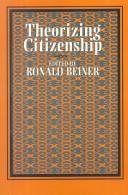
ISBN: 0791423352 Year: 1995 Publisher: Albany, N.Y. State University of New York Press
Abstract | Keywords | Export | Availability | Bookmark
 Loading...
Loading...Choose an application
- Reference Manager
- EndNote
- RefWorks (Direct export to RefWorks)
Book
ISBN: 0226041654 Year: 1983 Publisher: Chicago (Ill.): University of Chicago press
Abstract | Keywords | Export | Availability | Bookmark
 Loading...
Loading...Choose an application
- Reference Manager
- EndNote
- RefWorks (Direct export to RefWorks)
Judgment --- Political science --- Political science --- History
Book
ISBN: 9780812250596 Year: 2018 Publisher: Philadelphia University of Pennsylvania Press
Abstract | Keywords | Export | Availability | Bookmark
 Loading...
Loading...Choose an application
- Reference Manager
- EndNote
- RefWorks (Direct export to RefWorks)
| Listing 1 - 10 of 29 | << page >> |
Sort by
|

 Search
Search Feedback
Feedback About UniCat
About UniCat  Help
Help News
News